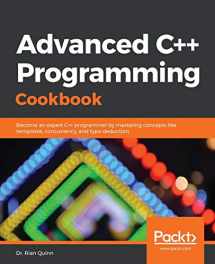
Advanced C++ Programming Cookbook
Book details
Summary
Description
A recipe-based guide to refining your C++ programming skills with the help of coding best practices, advanced programming concepts, and the latest features of C++17 and C++20
Key Features- Learn how to develop and design your own libraries
- Find solutions to your app development problems and implement them in a highly reusable manner, following library development best practices
- Explore advanced C++ features such as containers, coroutines, and modules
If you think you've mastered C++ and know everything it takes to write robust applications, you'll be in for a surprise. With this book, you'll gain comprehensive insights into C++, covering exclusive tips and interesting techniques to enhance your app development process.
You'll kick off with the basic principles of library design and development, which will help you understand how to write reusable and maintainable code. You'll then discover the importance of exception safety, and how you can avoid unexpected errors or bugs in your code. The book will take you through the modern elements of C++, such as move semantics, type deductions, and coroutines. As you advance, you'll delve into template programming - the standard tool for most library developers looking to achieve high code reusability. You'll explore the STL and learn how to avoid common pitfalls while implementing templates. Later, you'll learn about the problems of multithreaded programming such as data races, deadlocks, and thread starvation. You'll also learn high-performance programming by using benchmarking tools and libraries. Finally, you'll discover advanced techniques for debugging and testing to ensure code reliability.
By the end of this book, you'll have become an expert at C++ programming and will have gained the skills to solve complex development problems with ease.
What you will learn- Solve common C++ development problems by implementing solutions in a more generic and reusable way
- Achieve different levels of exception safety guarantees by introducing precise declarations
- Write library-quality code that meets professional standards
- Practice writing reliable, performant code that exposes consistent behavior in programs
- Understand why you need to implement design patterns and how it's done
- Work with complex examples to understand various aspects of good library design
This book is for intermediate and expert-level C++ developers who are looking to explore the lesser known functionalities of the language to improve the efficiency of their code and the way they develop applications. Basic knowledge of object-oriented programming concepts and the Standard Template Library (STL) is assumed.
Table of Contents- Getting Started With Library Development
- Using Exceptions for Error Handling
- Implementing Move Semantics
- Using Templates for Generic Programming
- Concurrency, Synchronisation, and Parallelization
- Optimizing Your Code for Performance
- Debugging and Testing
- Creating and Implementing Your own Container
- Exploring Type Erasure
- An In-Depth Look at Smart Pointers
- Common Patterns in C++
- A closer look at Type Deduction
- Bonus: Using C++20 Features


We would LOVE it if you could help us and other readers by reviewing the book
Book review



